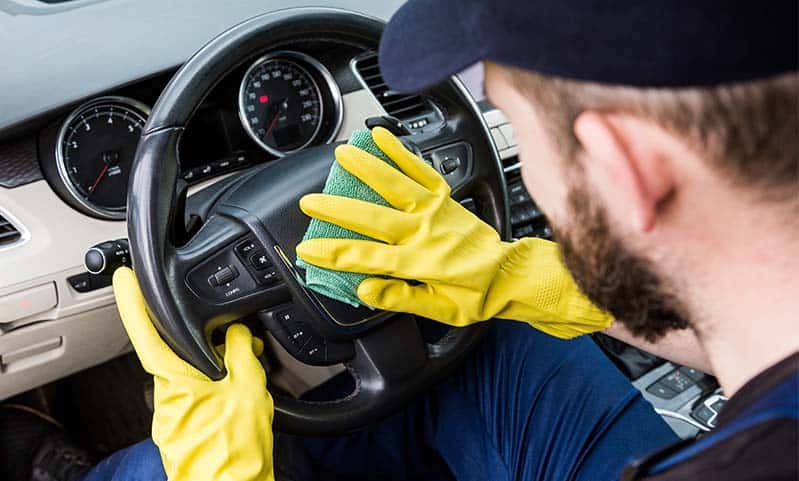Preparing for the holidays usually means shopping, booking flights, and dusting off the festive ornaments and holiday lights to turn your home into a winter wonderland.
But one area of holiday preparation that is often over looked involves the invisible organisms that invade our homes and make us sick.
Germs!
Let’s dive a little deeper into how your holiday road trip really looks.
Let’s start with your car. According to one study, one third of car owners only clean the inside of their car once a year.
That means the car is a hotbed of bacterial growth, mostly coming from of all the food we eat and spill. On a hot summer day, bacteria multiply and spread, and on a cold winter day, fungi form.
There are around 700 different strains of bacteria inside the average vehicle. The most dangerous and potentially deadly bacteria are Staphylococcus and Propionibacterium.
Steering wheels have four times more germs than a public toilet seat and six times more than your cell phone. Other germ-infested areas include cupholders, seatbelts, the gear shift, and the radio dials.
The average gas pump handle is 11,835 times germier than a public toilet seat and its unlikely drivers will wash their hands before getting in their car after pumping gas.
Even rideshares and rental cars are of concern.
The solution is not to cancel your holiday plans or drive eight hours in a hazmat suit.
Simply sanitize the surfaces you touch the most (including your car keys), change the air filters, vacuum the floors, and shampoo the mats.
Cleaning your car after a long road trip should be a priority, as eating in the car and filling up the tank occurs more than usual.
On a long road trip, it’s likely that you’ll stop at a truck stop diner or fast dinner spot. Beware of plastic menus and tabletops.
“They usually put a thin layer of E. coli down on the table for us to eat off of,” said microbiologist Charles Gerba, known as Dr. Germ for his incessant and unwarranted testing of germs on any and all surfaces.
Prepare by bringing disinfectant wipes.
Maybe you stop into a grocery store to grab some snacks for the road. Unfortunately, you’re still not safe from the market microbes. Self-checkouts especially will have you checking yourself into the hospital.
Gerba said that after testing, he was surprised to find fecal bacteria and antibiotic-resistant bacteria. If Dr. Germ is surprised than we’re all in trouble.
He no longer uses self-checkout. Luckily, dollar bills and coins don’t spread bacteria from person to person, so if you’re paying in cash then you’re safe.
If you’re splitting up your trip over multiple days, then you have a whole new beast to tackle: hotels. Obviously, there will be E. coli in the toilet.
However, researchers from the University of Houston shed some light on other bacterial breeding grounds inside hotels. Sampling surfaces of hotels in Texas, they found that the bathroom sink and floor contained high levels of E. coli, as did the carpet, phone, light switch, and TV remote.
Gerba, of course, did a similar study. He found that whether it’s a cheap hotel or a five-star establishment, the germ level remains the same: disgusting.
The room service menu and the hair dryer were especially germy, but the TV remote remains the germiest item in the hotel room.
“In fact, we found semen on 30% of the remote controls we tested.”
So, maybe hotels are not appealing to you right now. How about Airbnb?
Airbnb is really a gamble. Since Airbnb policies don’t allow everyone to write and post a review, it can be hard to know what you’re going to get.
There are plenty of horror stories, but at least you won’t have to deal with TV remotes. Since it only takes four hours for germs on a family of four to spread to 90 percent of home surfaces, we can expect the same number of germs in an Airbnb as in an average house.
That’s about 9,000 different species of bacteria and fungus. Of course, pets and kids make those numbers higher. Luckily, most of the microbes and fungi in homes are harmless.
People should be more concerned with mold and mildew, which cause lung infections.
If your Airbnb stay is especially disgusting, take photos and act fast.
Guests must file a formal complaint within 24 hours of check-in to be refunded. Always communicate with the host through Airbnb.
All it takes to have a happy and healthy holiday is to make sure you’re keeping your car and your hands clean. Stay safe and avoid TV remotes and self-checkouts and enjoy a germ-free holiday!
